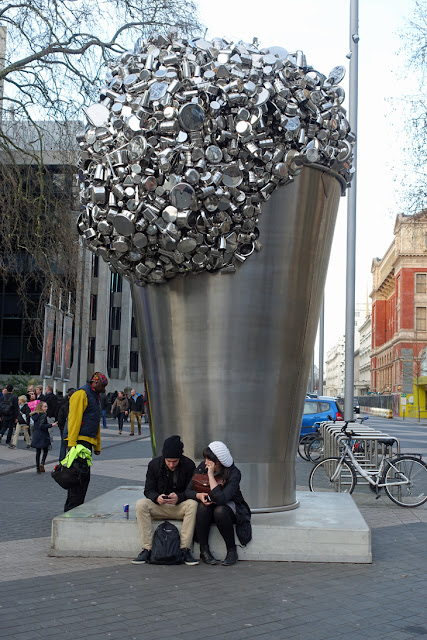First stop, the neo-Byzantine Westminster Cathedral, ten minutes
walk from Victoria Rail Station.
Through the Holy Door for 2016 and into the silence of the cathedral. It’s deep into Advent and extra confessors are hard at work, dispensing forgiveness and Grace with an
especial joy this Holy Year of Mercy. Four confessionals are in operation and
the queue of about 40 penitents are all healed within ten to fifteen
minutes.
On to St Paul’s Bookshop; books, magazines, music, eBibles,
statues, cards, holy pictures, crucifixes, rosaries, medals, candles, aromatic
incenses, burners, priestly clothing...and 1.000 other things. It is a mystery
how people manage to tear themselves away in time to spend some time in the
Catholic Truth Society (CTS) bookshop, just two minutes away on the Cathedral Piazza.
I managed it but had little money remaining when I left.
Then it was off to South Kensington Tube station and five minutes walking
in the tunnel brought me to the exit for the Victoria & Albert (V&A),
Science and Natural History Museums.
At the exit there was a statue I had never seen before, Subodh
Gupta’s ‘When Soak Becomes Spill,’ a huge shiny stainless steel bucket filled
with hundreds of equally shiny and attractive containers, a message about the cost
to the earth’s resources of meeting the desires of a consumer society.
Then on to the imposing bulk of the V&A and the exhibition of over
100 prints by Julia Margaret Cameron.
Inside, through large echoing exhibition rooms, past groups of visitors taking photos and selfies...
On, through halls populated only by statues...
Past the Chinese section with its glass cases of highly embroidered robes...
...and up the stairs to the Julia Margaret Cameron (JMC) exhibition. She is one of the 19th century
pioneers of photography in the UK, was born 200 years ago and held her first
major exhibition 150 years ago - in this very museum.
To be frank, JMC is not one of my favourite photographers.Yes, her body of work is impressive for someone who was only given a camera at the age of 48 and two years later in 1865 successfully convinced her contact Sir Henry Cole to provide an exhibition for her at the South Kensington Museum (now the V&A). Certainly she devoted a huge amount of time to her craft and learned quickly – and these were days before digital photography when developing photographs was very physical, very time-consuming and involved dark rooms and multiple baths of dangerous chemicals.
But she was far from a perfectionist in the printing process.
Her prints were usually out of focus and often bore scratches, smudges – even fingerprints.
It’s clear from her letters - some of them, with distinctive large loopy handwriting,
are on show – that she was convinced of her own genius.
She was also a child of her time and, although renowned for
her portraits, they are uniformly dull set pieces, mostly infants or young
women (usually friends, family or servants) posing as mythological or ancient biblical
figures...never a smile or a hint of normalcy in sight. Of course, these were
the darkest days of Queen Victoria when folk’s minds were focused on higher things,
such as (allegedly) covering up piano legs to avoid giving temptation...she is
a creature of her time, as I imagine most of us are of ours.
Nevertheless, she did well to popularise the medium and her portraits
of social luminaries such as Charles Dickens, Alfred Lord Tennyson and Robert
Browning are historically significant (although Dickens did not admire all
of her pictures of him). Some of the photographs of her family (e.g. her niece
Julia Jackson) have an unusually direct and quite modern immediacy.
Frankly, it was a pleasure to escape into the fresh air after
being submerged for an hour in the cloying kitsch of JMC’s world view. Outside, three girls were playing brass instruments, the shimmering
notes soaring into the sky.
Further on, the lawn outside the Science Museum had been transformed
into an ice rink and carnival. The excited cries of children coloured the air and warmed the soul.
Wonderful - and a world away from JMC's pickled infants.











No comments:
Post a Comment